Tigers & Rhinos: Epic Chitwan Safari, Nepal
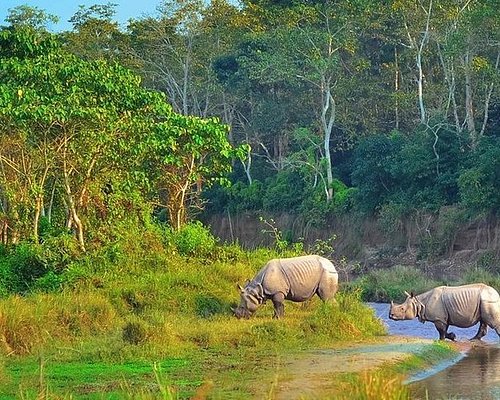
Chitwan National Park is a must-visit destination for nature lovers and wildlife enthusiasts. Located in Nepal, this national park is famous for its diverse flora and fauna, including the majestic Bengal tiger and the rare one-horned rhinoceros. The park offers a unique opportunity to experience the beauty of nature and witness incredible wildlife up close.
Overview of Chitwan National Park
Spread across an area of 932 square kilometres, Chitwan National Park is a UNESCO World Heritage Site. Its rich biodiversity makes it one of the most important national parks in Asia. The park is home to more than 700 species of wildlife, including elephants, crocodiles, sloth bears, and numerous bird species. It also boasts a variety of ecosystems, including grasslands, rivers, and dense forests, making it an ideal habitat for a wide range of flora and fauna.
Visitors to Chitwan National Park have the opportunity to explore the park through various activities such as jungle safaris, nature walks, and canoe rides. Accompanied by experienced guides, you can venture deep into the wilderness and witness the beauty of nature unfold before your eyes. The park also offers elephant and jeep safaris, providing a thrilling experience for wildlife enthusiasts.
Importance of tiger and rhino conservation
Chitwan National Park plays a vital role in the conservation of endangered species like the Bengal tiger and the one-horned rhinoceros. The park has been successful in its efforts to protect these incredible creatures from poaching and habitat destruction. Through continuous conservation efforts, the population of tigers and rhinos in the park has increased significantly over the years.
Protecting tigers and rhinos is not only important for their survival but also for maintaining the balance of the ecosystem. Tigers, as apex predators, help control the population of herbivores, ensuring the overall health of the ecosystem. Similarly, rhinos play a crucial role in maintaining grasslands by feeding on certain plant species and preventing excessive growth.
Chitwan National Park offers a unique opportunity to witness the beauty of nature and contribute to the conservation of endangered species. By visiting the park, you not only get to experience the thrill of being in the wild but also play a part in ensuring the long-term survival of tigers and rhinos. So, pack your bags and embark on an adventure of a lifetime at Chitwan National Park!
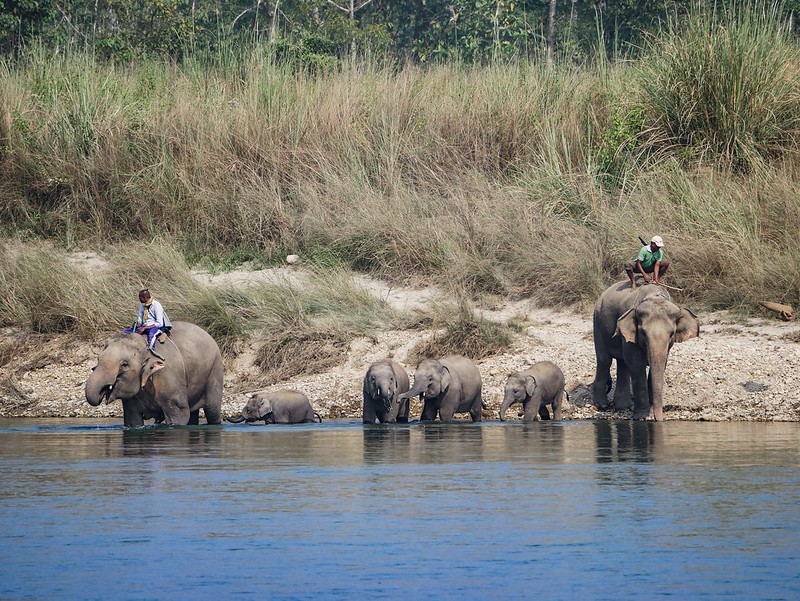
Getting to Chitwan
Modes of transportation to Chitwan
Chitwan National Park can be easily accessed by various modes of transportation. Here are some options to consider:
-
By Air: The nearest airport to Chitwan is Bharatpur Airport, which is well-connected to major cities in Nepal like Kathmandu, Pokhara, and Nepalgunj. From the airport, you can hire a taxi or take a bus to reach the national park.
-
By Road: Chitwan is well-connected to major cities in Nepal by road. You can hire a private car or take a bus from Kathmandu, Pokhara, or other nearby cities. The journey may take around 5-6 hours, depending on the traffic and road conditions.
-
By Bus: Regular bus services are available from Kathmandu, Pokhara, and other major cities to Chitwan. Buses are an affordable option and offer a chance to enjoy the scenic beauty along the way. It is recommended to book your bus tickets in advance to secure a seat.
Tips for travelling to Chitwan National Park
Here are some helpful tips for a pleasant and enjoyable trip to Chitwan National Park:
-
Pack light and comfortable clothing: The weather in Chitwan can vary, so it is advisable to pack both lightweight and warm clothing. Don't forget to bring comfortable walking shoes, a hat, and sunglasses.
-
Apply insect repellent: As Chitwan is a tropical region, it is advisable to apply insect repellent to protect yourself from mosquito bites.
-
Follow park rules and guidelines: When visiting the national park, it is important to follow the rules and guidelines set by the park authorities. This includes maintaining a safe distance from wildlife, not littering, and respecting the park's flora and fauna.
-
Stay hydrated: Carry a water bottle with you to stay hydrated during your outdoor activities in the park.
-
Book activities in advance: To ensure availability, it is recommended to book your activities, such as jungle safaris and nature walks, in advance, either through your hotel or a reputable tour operator.
-
Respect the wildlife: While exploring the park, remember to observe wildlife from a safe distance and avoid disturbing their natural habitats.
Visiting Chitwan National Park is a once-in-a-lifetime experience that offers a unique opportunity to connect with nature and contribute to wildlife conservation efforts. By following these tips and making the necessary arrangements, you can have a memorable and responsible trip to this incredible national park.
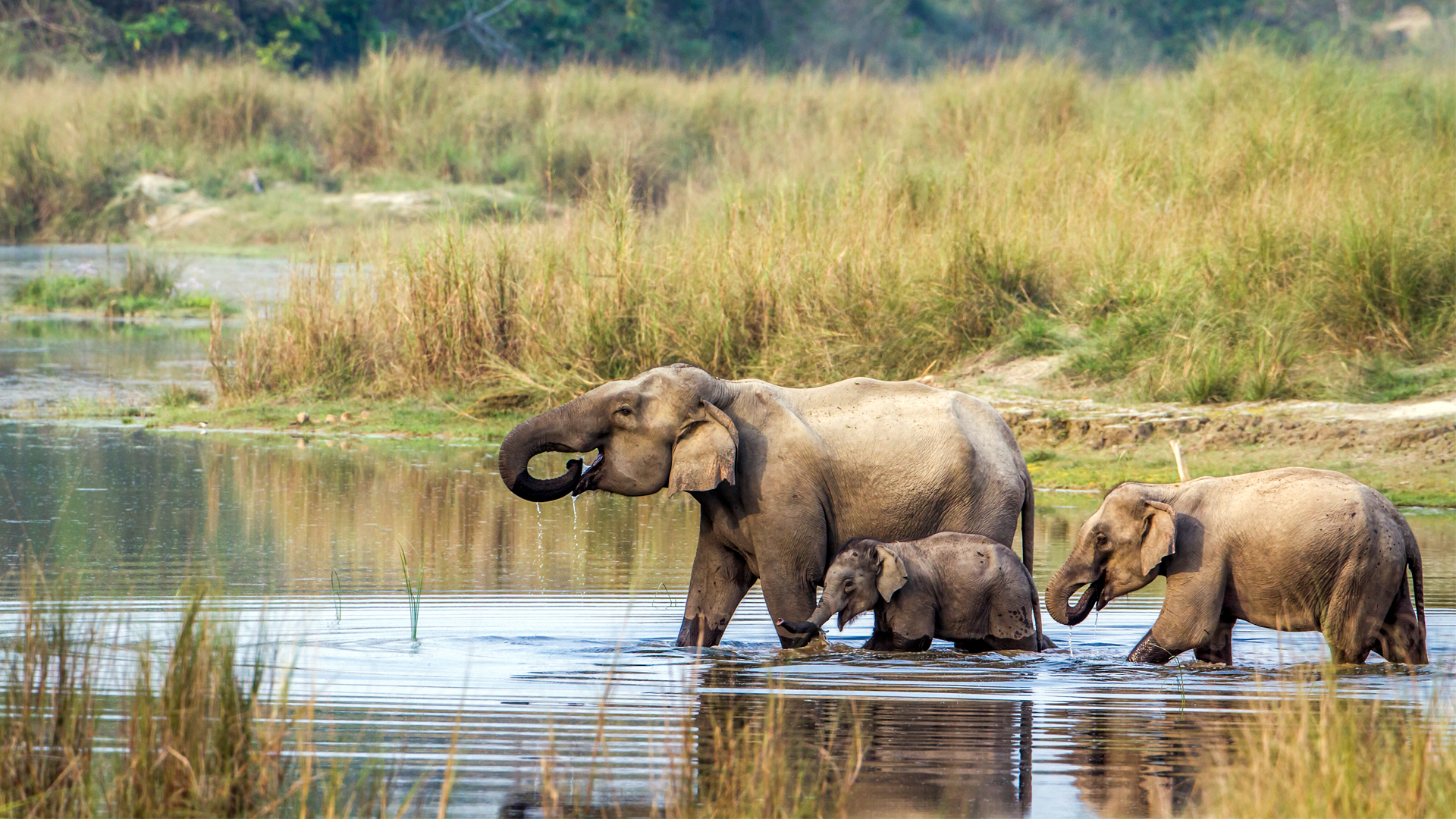
Exploring Chitwan
Guided jungle safari tour
Embark on a thrilling guided jungle safari tour in Chitwan National Park to experience the rich biodiversity of the region. Here are some highlights of this adventure:
-
Jeep Safari: Hop on a jeep and explore the diverse landscapes of the park, from grasslands to riverbanks, while keeping an eye out for exotic wildlife species.
-
Elephant Safari: For a truly unique experience, opt for an elephant safari where you will ride on the back of these majestic creatures and venture deep into the heart of the jungle.
-
Nature Walks: Get up close and personal with nature as you embark on guided nature walks through the park's lush jungles. Learn about the different plant and animal species that call Chitwan their home.
Spotting tigers and rhinos in the wild
Chitwan National Park is renowned for its population of tigers and rhinoceros. Here's what you need to know to spot these magnificent creatures in their natural habitat:
-
Tiger Safari: Join a guided tiger safari to increase your chances of spotting these elusive predators. Expert guides will take you to the best spots known for tiger sightings.
-
Rhino Watching: Explore the park's grasslands and wetlands to catch a glimpse of the endangered one-horned rhinoceros. These massive creatures roam freely in Chitwan National Park.
-
Bird Watching: Chitwan is a paradise for bird lovers, with over 550 species of birds. Take a guided tour or venture out on your own to spot vibrant and rare bird species.
Chitwan National Park offers an incredible opportunity to immerse yourself in nature and witness the beauty of Nepal's wildlife. Whether you're on a guided safari tour, searching for tigers and rhinos, or simply enjoying the serene surroundings, Chitwan promises a memorable experience. Take the necessary precautions, follow the park's regulations, and embark on this adventure with a sense of wonder and respect for the natural world. Let the magic of Chitwan National Park unfold before your eyes.
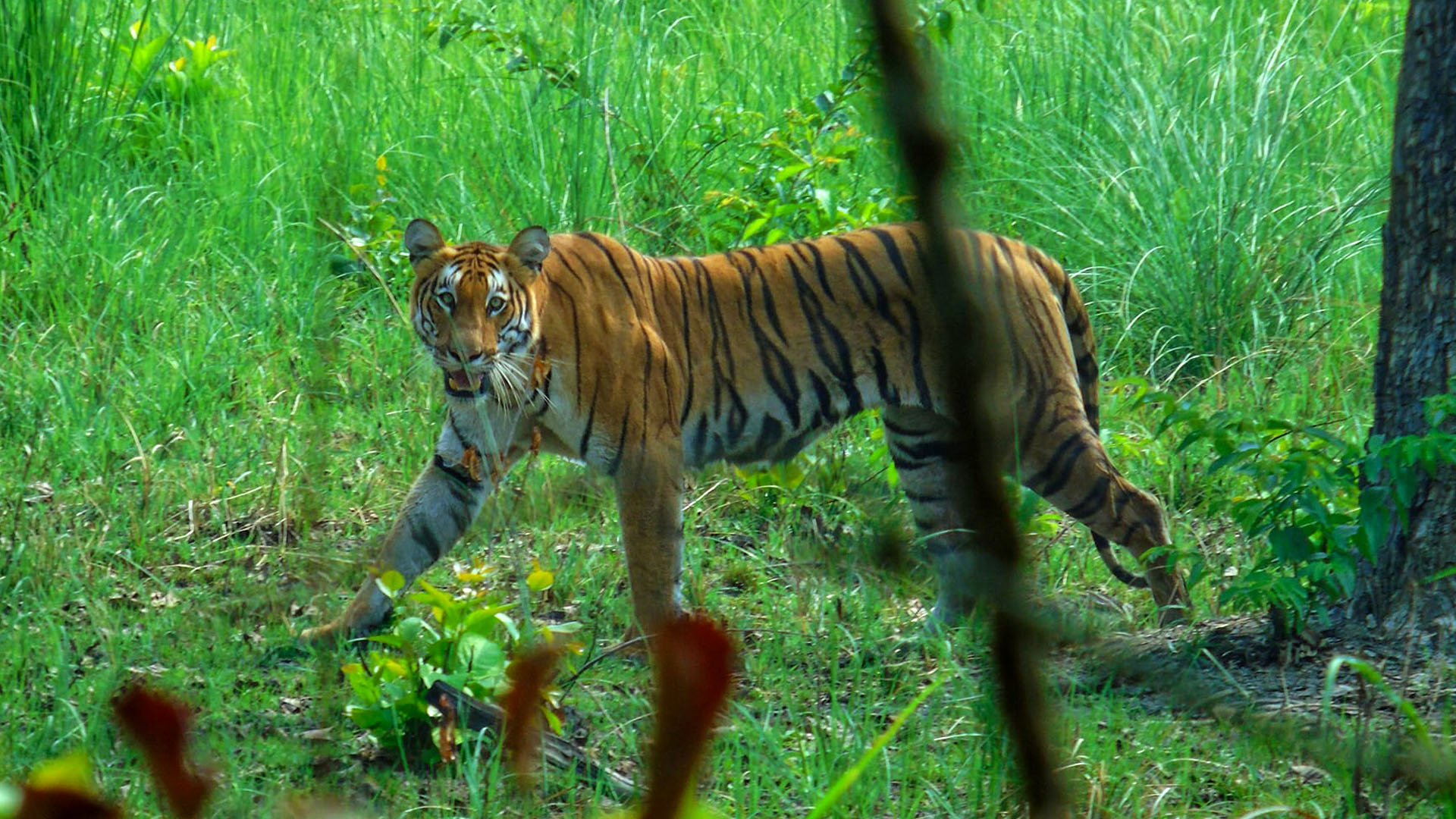
The Majestic Tigers
Characteristics and behaviour of tigers
When exploring Chitwan National Park, one of the most exciting experiences is to spot the majestic tigers in their natural habitat. These incredible creatures are known for their striking appearance and powerful presence. Here are some key characteristics and behaviours of tigers:
- Appearance: Tigers are easily identifiable by their distinctive orange fur with black stripes. With a muscular build and a length of up to 10 feet, these felines exude strength and grace.
- Solitary hunters: Tigers are solitary animals and prefer to hunt alone. They are stealthy predators and rely on their camouflaged coats to stalk their prey.
- Territorial: Each tiger marks its territory by spraying urine and scratching trees. They need a large territory to roam and hunt, making Chitwan National Park an ideal habitat for them.
- Excellent swimmers: Unlike many other big cats, tigers are adept swimmers and are often found cooling off in the park's rivers and lakes.
Conservation efforts for tiger preservation
Due to habitat loss and poaching, tigers are classified as endangered species. Chitwan National Park plays a crucial role in the conservation of these magnificent creatures. Here are some conservation efforts undertaken in the park:
- Anti-poaching initiatives: The park has implemented rigorous anti-poaching measures to combat the illegal hunting of tigers. Well-trained park rangers patrol the area to ensure the safety of the tigers.
- Community involvement: Local communities play a crucial role in tiger conservation. They are actively involved in awareness campaigns and initiatives, emphasizing the importance of protecting these endangered animals.
- Habitat preservation: Chitwan National Park focuses on preserving the tiger's natural habitat by minimizing human encroachment. Efforts are made to maintain a balanced ecosystem that allows tigers to thrive.
By promoting responsible tourism and raising awareness about tiger conservation, Chitwan National Park aims to secure a future for these magnificent creatures. When visiting the park, always remember to respect their habitat and maintain a safe distance to ensure the well-being of both humans and tigers. Witnessing the beauty and power of tigers in Chitwan National Park is an experience that will stay with you for a lifetime.

The Incredible Rhinos
Information about one-horned rhinos
When exploring Chitwan National Park, you may also have the opportunity to encounter the incredible one-horned rhinos in their natural habitat. Here is some information about these majestic creatures:
-
Appearance: One-horned rhinos, also known as Indian rhinos, are easily recognizable by their massive size and a single horn on their snout. They have thick, grey-brown skin that acts as armour, protecting them from predators.
-
Herbivores: Unlike tigers, rhinos are herbivores and feed on grasses, fruits, and leaves. They have a prehensile upper lip that helps them grasp vegetation while grazing.
-
Social behaviour: One-horned rhinos are generally solitary animals, with males establishing territories to defend. However, they can also tolerate each other's presence in small groups near watering holes or during mating season.
-
Conservation status: These rhinos are classified as vulnerable, with their population declining due to poaching and habitat loss. Chitwan National Park plays a vital role in their conservation by providing a protected space for their survival.
Challenges faced by rhinos in Chitwan
While Chitwan National Park is a sanctuary for the one-horned rhinos, they still face several challenges that threaten their existence:
-
Poaching: The illegal hunting of rhinos for their horns is a significant threat to their population. These horns are highly valuable in some markets, driving the demand for them.
-
Habitat loss: Deforestation and encroachment of human settlements near the park are diminishing the available habitat for rhinos. This further increases the competition for resources and raises the risk of human-wildlife conflict.
-
Invasive species: The spread of invasive plant species within the park can affect the rhinos' food sources and disrupt the balance of the ecosystem.
Efforts are being made to tackle these challenges and ensure the well-being of the one-horned rhinos in Chitwan National Park. By strengthening anti-poaching measures, promoting sustainable tourism, and involving local communities in conservation initiatives, the park aims to secure a bright future for these remarkable creatures.
When witnessing the magnificence of the one-horned rhinos, it is important to appreciate their presence and actively participate in their protection. Remember to maintain a safe distance, respect their habitat, and spread awareness about their conservation needs. Together, we can contribute towards the preservation of these incredible rhinos in Chitwan National Park.
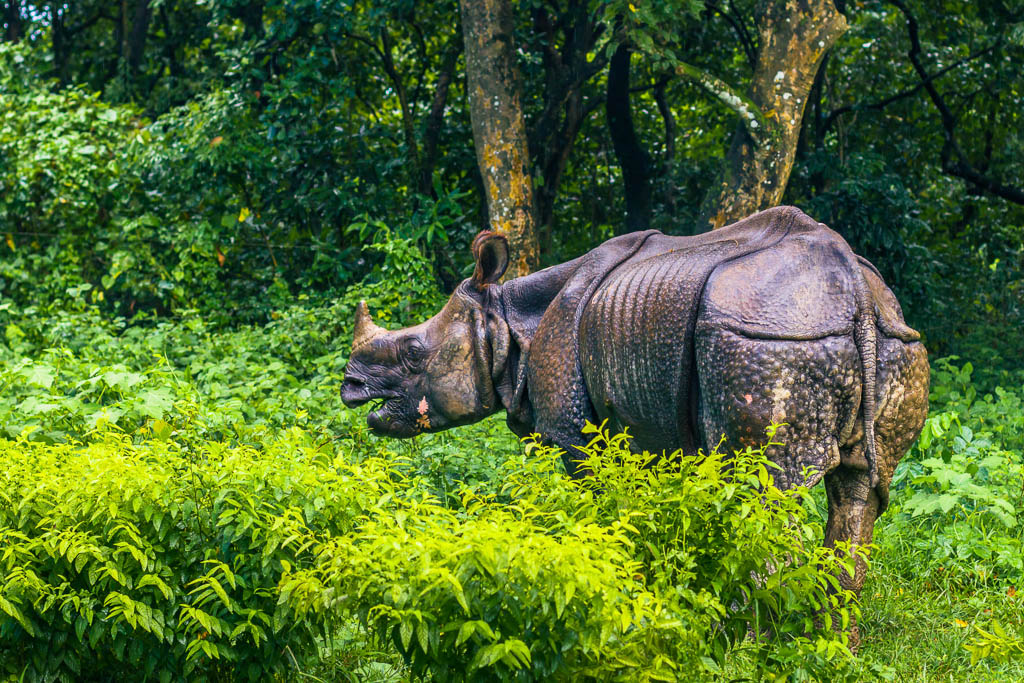
Safari Accommodations
Recommended lodges and resorts in Chitwan
If you're planning a safari adventure in Chitwan National Park, you'll need a comfortable and convenient place to stay. Here are some recommended lodges and resorts that offer a blend of luxury and proximity to the park:
-
Chitwan Gaida Lodge: Situated along the banks of the Rapti River, Chitwan Gaida Lodge offers a serene atmosphere and stunning views of the surrounding wilderness. The lodge provides spacious rooms with modern amenities and arranges various wildlife activities, including elephant safaris and jungle walks.
-
Meghauli Serai: Nestled in the heart of Chitwan National Park, Meghauli Serai offers a luxurious and eco-friendly experience. The resort boasts well-appointed villas with private plunge pools, allowing you to relax in style after a day of wildlife exploration. The on-site spa offers rejuvenating treatments, and the knowledgeable staff can arrange exclusive elephant encounters.
-
Bharatpur Garden Resort: Located in Bharatpur, just outside the park's entrance, Bharatpur Garden Resort is a budget-friendly option without compromising on comfort. The resort features spacious rooms, an outdoor pool, and a restaurant serving delicious local and international cuisine. It also offers tour packages that include park visits and cultural excursions.
Amenities and services provided
These accommodations aim to provide a memorable and enjoyable stay for their guests. Here are some common amenities and services offered by these lodges and resorts:
| Accommodation | Amenities | Services |
|---|---|---|
| Chitwan Gaida Lodge | - Spacious rooms - Restaurant and bar - Wildlife activities- Riverside views |
- Elephant safaris- Guided jungle walks- Cultural performances- Transportation services |
| Meghauli Serai | - Luxury villas with private plunge pools- Spa and wellness centre- On-site dining options- Nature walks | - Exclusive elephant encounters- Cultural experiences- Airport transfers- 24-hour concierge |
| Bharatpur Garden Resort | - Comfortable rooms- Outdoor swimming pool- Restaurant- Garden area | - Park visit packages- Cultural excursions- Car rental- Laundry service |
By choosing any of these accommodations, you can have a cosy and convenient base for your Chitwan safari experience. Whether you prefer luxury, eco-friendly, or budget-friendly options, there is a lodge or resort to suit your preferences. Remember to book in advance to secure your desired dates and enjoy a hassle-free stay in this magnificent wildlife destination.
Local Culture and Activities
Indigenous Tharu culture
Immerse yourself in the rich indigenous Tharu culture during your stay in Chitwan. The Tharu people have a unique heritage and way of life that can be explored through various cultural activities:
- Tharu Village Tour: Take a guided tour of a Tharu village and witness their traditional houses, way of dressing, and farming practices. You can interact with the friendly locals and learn about their customs and traditions.
- Cultural Performances: Enjoy vibrant cultural performances, including Tharu dances, music, and theatre. These captivating performances showcase the artistic talent and storytelling skills of the Tharu community.
- Tharu Cuisine: Delight your taste buds with authentic Tharu cuisine. Try the traditional dishes made with locally sourced ingredients, such as wild mushrooms, river fish, and millet-based bread.
Additional activities in Chitwan National Park
Apart from the wildlife safaris, there are several other activities that you can enjoy in Chitwan National Park:
- Bird Watching: Chitwan is a paradise for bird lovers, with over 600 species of birds. Embark on a bird-watching tour and spot colourful and rare bird species in their natural habitat.
- Cycling: Explore the park's picturesque trails on a bicycle. Rent a bike and ride through the scenic landscapes, observing the diverse flora and fauna along the way.
- Canoeing: Float along the Rapti River in a traditional dugout canoe and admire the serene beauty of the park. Keep an eye out for crocodiles, birds, and other wildlife that inhabit the riverbanks.
- Nature Walks: Join a guided nature walk and discover the hidden wonders of Chitwan. Learn about the park's ecosystem, medicinal plants, and the importance of conservation from knowledgeable local guides.
These cultural experiences and additional activities add depth to your Chitwan safari adventure, allowing you to appreciate the region's natural beauty and rich cultural heritage. Engage with the local Tharu culture and indulge in diverse activities to make your visit to Chitwan National Park truly unforgettable.
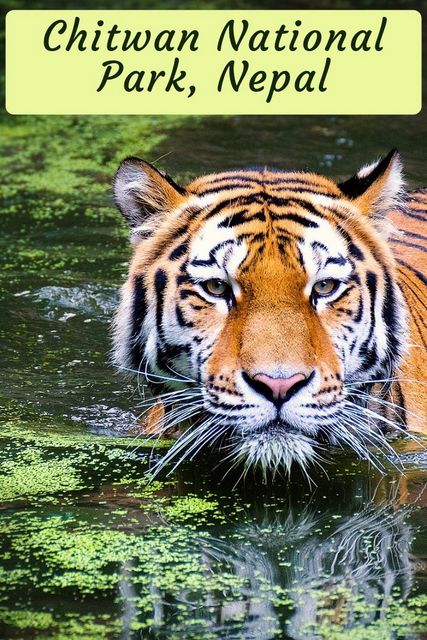
Importance of Conservation
Role of Chitwan National Park in biodiversity conservation
When you visit Chitwan National Park, you are not only embarking on an exciting safari adventure but also contributing to the vital mission of biodiversity conservation. The park plays a crucial role in preserving the diverse flora and fauna of the region:
- Protected Species: Chitwan is home to several endangered species, including the iconic Bengal tiger and the one-horned rhinoceros. By safeguarding their habitats and monitoring their populations, the park is helping to ensure the survival of these magnificent creatures.
- Preservation of Ecosystems: Chitwan National Park comprises various ecosystems, including riverine forests, grasslands, and wetlands. By protecting these ecosystems, the park maintains the delicate balance of nature and provides a safe haven for countless plant and animal species.
- Conservation Research: The park actively engages in research to better understand the ecology and behaviour of the wildlife within its boundaries. These studies help inform conservation strategies and contribute to global efforts in safeguarding biodiversity.
Initiatives for tiger and rhino protection
Chitwan National Park has implemented several initiatives aimed specifically at protecting the tiger and rhino populations:
| Tiger Conservation | Rhino Conservation |
|---|---|
| Anti-Poaching Efforts: The park employs dedicated anti-poaching teams who patrol the area to prevent illegal hunting and trade of tiger parts. | Rhino Monitoring: The park closely monitors the rhino population through regular surveys and tracking to ensure their safety and well-being. |
| Habitat Restoration: Chitwan National Park focuses on habitat restoration projects, including the reforestation of key tiger habitats. | Community Involvement: The park works closely with local communities to raise awareness about the importance of protecting rhinos and involves them in conservation efforts. |
| Translocation Programs: In collaboration with other conservation organizations, the park carries out translocation programs to establish new tiger populations in suitable habitats. | Improved Security Measures: The park has strengthened security measures, such as the use of advanced surveillance technology, to combat potential threats to rhinos. |
By supporting the conservation initiatives of Chitwan National Park, you are actively contributing to the preservation of these magnificent species and their habitats. Your visit becomes not just an adventure but a profound step towards safeguarding biodiversity for future generations.
